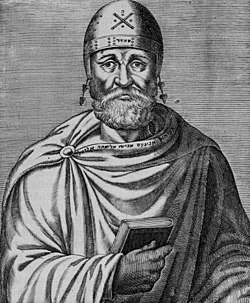Philo of Alexandria Quote
The Limit of Happiness Is the Presence of GodBut it is something great that Abraham asks, namely that God shall not pass by nor remove to a distance and leave his soul desolate and empty (Gen. 18:3). For the limit of happiness is the presence of God, which completely fills the whole soul with his whole incorporeal and eternal light.
Philo of Alexandria
The Limit of Happiness Is the Presence of GodBut it is something great that Abraham asks, namely that God shall not pass by nor remove to a distance and leave his soul desolate and empty (Gen. 18:3). For the limit of happiness is the presence of God, which completely fills the whole soul with his whole incorporeal and eternal light.
Related Quotes
About Philo of Alexandria
Philo of Alexandria (; Ancient Greek: Φίλων, romanized: Phílōn; Hebrew: יְדִידְיָה, romanized: Yəḏīḏyāh; c. 20 BCE – c. 50 CE), also called Philō Judæus, was a Hellenistic Jewish philosopher who lived in Alexandria, in the Roman province of Egypt.
The only event in Philo's life that can be decisively dated is his representation of the Alexandrian Jews in a delegation to the Roman emperor Caligula in 40 CE following civil strife between the Jewish and Greek communities of Alexandria.
Philo was a leading writer of the Hellenistic Jewish community in Alexandria, Egypt. He wrote expansively in Koine Greek on philosophy, politics, and religion in his time; specifically, he explored the connections between Greek Platonic philosophy and late Second Temple Judaism. For example, he maintained that the Greek-language Septuagint and the Jewish law still being developed by the rabbis of the period together serve as a blueprint for the pursuit of individual enlightenment.
Philo's deployment of allegory to harmonize Jewish scripture, mainly the Torah, with Greek philosophy was the first documented of its kind, and thereby often misunderstood. Many critics of Philo assumed his allegorical perspective would lend credibility to the notion of legend over historicity. Philo often advocated a literal understanding of the Torah and the historicity of such described events, while at other times favoring allegorical readings.
The only event in Philo's life that can be decisively dated is his representation of the Alexandrian Jews in a delegation to the Roman emperor Caligula in 40 CE following civil strife between the Jewish and Greek communities of Alexandria.
Philo was a leading writer of the Hellenistic Jewish community in Alexandria, Egypt. He wrote expansively in Koine Greek on philosophy, politics, and religion in his time; specifically, he explored the connections between Greek Platonic philosophy and late Second Temple Judaism. For example, he maintained that the Greek-language Septuagint and the Jewish law still being developed by the rabbis of the period together serve as a blueprint for the pursuit of individual enlightenment.
Philo's deployment of allegory to harmonize Jewish scripture, mainly the Torah, with Greek philosophy was the first documented of its kind, and thereby often misunderstood. Many critics of Philo assumed his allegorical perspective would lend credibility to the notion of legend over historicity. Philo often advocated a literal understanding of the Torah and the historicity of such described events, while at other times favoring allegorical readings.
